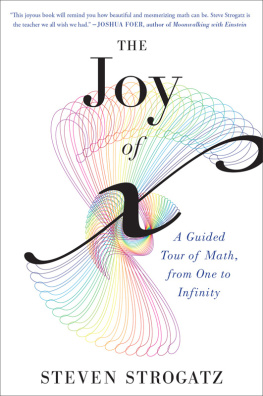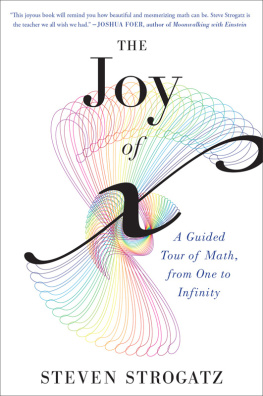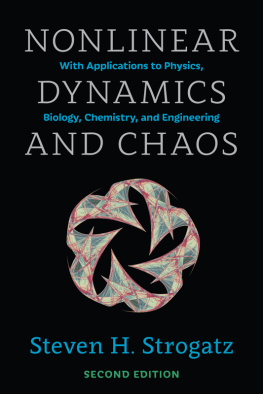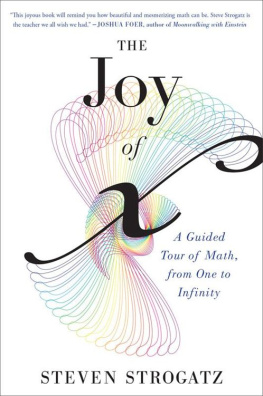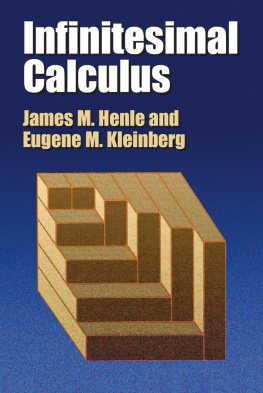Steven Strogatz - Infinite Powers: How Calculus Reveals the Secrets of the Universe
Here you can read online Steven Strogatz - Infinite Powers: How Calculus Reveals the Secrets of the Universe full text of the book (entire story) in english for free. Download pdf and epub, get meaning, cover and reviews about this ebook. year: 2019, publisher: Houghton Mifflin Harcourt, genre: Science / Children. Description of the work, (preface) as well as reviews are available. Best literature library LitArk.com created for fans of good reading and offers a wide selection of genres:
Romance novel
Science fiction
Adventure
Detective
Science
History
Home and family
Prose
Art
Politics
Computer
Non-fiction
Religion
Business
Children
Humor
Choose a favorite category and find really read worthwhile books. Enjoy immersion in the world of imagination, feel the emotions of the characters or learn something new for yourself, make an fascinating discovery.
- Book:Infinite Powers: How Calculus Reveals the Secrets of the Universe
- Author:
- Publisher:Houghton Mifflin Harcourt
- Genre:
- Year:2019
- Rating:4 / 5
- Favourites:Add to favourites
- Your mark:
- 80
- 1
- 2
- 3
- 4
- 5
Infinite Powers: How Calculus Reveals the Secrets of the Universe: summary, description and annotation
We offer to read an annotation, description, summary or preface (depends on what the author of the book "Infinite Powers: How Calculus Reveals the Secrets of the Universe" wrote himself). If you haven't found the necessary information about the book — write in the comments, we will try to find it.
Infinite Powers: How Calculus Reveals the Secrets of the Universe — read online for free the complete book (whole text) full work
Below is the text of the book, divided by pages. System saving the place of the last page read, allows you to conveniently read the book "Infinite Powers: How Calculus Reveals the Secrets of the Universe" online for free, without having to search again every time where you left off. Put a bookmark, and you can go to the page where you finished reading at any time.
Font size:
Interval:
Bookmark:
Copyright 2019 by Steven Strogatz
Illustrations 2019 by Margaret C. Nelson
All rights reserved
For information about permission to reproduce selections from this book, write to or to Permissions, Houghton Mifflin Harcourt Publishing Company, 3 Park Avenue, 19th Floor, New York, New York 10016.
hmhbooks.com
Library of Congress Cataloging-in-Publication Data
Names: Strogatz, Steven H. (Steven Henry), author.
Title: Infinite powers : how calculus reveals the secrets of the universe / Steven Strogatz.
Description: Boston : Houghton Mifflin Harcourt, 2019. |
Includes bibliographical references and index.
Identifiers: LCCN 2018042561 (print) | LCCN 2018049721 (ebook) | ISBN 9781328880017 (ebook) | ISBN 9781328879981 (hardcover)
Subjects: LCSH: Calculus. | CalculusHistory. | Archimedes. | Differential calculus.
Classification: LCC QA303.2 (ebook) | LCC QA303.2 .S78 2010 (print) | DDC 515dc23
LC record available at https://lccn.loc.gov/2018042561
Cover design by Martha Kennedy
v1.0319

Without calculus, we wouldnt have cell phones, computers, or microwave ovens. We wouldnt have radio. Or television. Or ultrasound for expectant mothers, or GPS for lost travelers. We wouldnt have split the atom, unraveled the human genome, or put astronauts on the moon. We might not even have the Declaration of Independence.
Its a curiosity of history that the world was changed forever by an arcane branch of mathematics. How could it be that a theory originally about shapes ultimately reshaped civilization?
The essence of the answer lies in a quip that the physicist Richard Feynman made to the novelist Herman Wouk when they were discussing the Manhattan Project. Wouk was doing research for a big novel he hoped to write about World War II, and he went to Caltech to interview physicists who had worked on the bomb, one of whom was Feynman. After the interview, as they were parting, Feynman asked Wouk if he knew calculus. No, Wouk admitted, he didnt. You had better learn it, said Feynman. Its the language God talks.
For reasons nobody understands, the universe is deeply mathematical. Maybe God made it that way. Or maybe its the only way a universe with us in it could be, because nonmathematical universes cant harbor life intelligent enough to ask the question. In any case, its a mysterious and marvelous fact that our universe obeys laws of nature that always turn out to be expressible in the language of calculus as sentences called differential equations. Such equations describe the difference between something right now and the same thing an instant later or between something right here and the same thing infinitesimally close by. The details differ depending on what part of nature were talking about, but the structure of the laws is always the same. To put this awesome assertion another way, there seems to be something like a code to the universe, an operating system that animates everything from moment to moment and place to place. Calculus taps into this order and expresses it.
Isaac Newton was the first to glimpse this secret of the universe. He found that the orbits of the planets, the rhythm of the tides, and the trajectories of cannonballs could all be described, explained, and predicted by a small set of differential equations. Today we call them Newtons laws of motion and gravity. Ever since Newton, we have found that the same pattern holds whenever we uncover a new part of the universe. From the old elements of earth, air, fire, and water to the latest in electrons, quarks, black holes, and superstrings, every inanimate thing in the universe bends to the rule of differential equations. I bet this is what Feynman meant when he said that calculus is the language God talks. If anything deserves to be called the secret of the universe, calculus is it.
By inadvertently discovering this strange language, first in a corner of geometry and later in the code of the universe, then by learning to speak it fluently and decipher its idioms and nuances, and finally by harnessing its forecasting powers, humans have used calculus to remake the world.
Thats the central argument of this book.
If its right, it means the answer to the ultimate question of life, the universe, and everything is not 42, with apologies to fans of Douglas Adams and The Hitchhikers Guide to the Galaxy. But Deep Thought was on the right track: the secret of the universe is indeed mathematical.
Feynmans quip about Gods language raises many profound questions. What is calculus? How did humans figure out that God speaks it (or, if you prefer, that the universe runs on it)? What are differential equations and what have they done for the world, not just in Newtons time but in our own? Finally, how can any of these stories and ideas be conveyed enjoyably and intelligibly to readers of goodwill like Herman Wouk, a very thoughtful, curious, knowledgeable person with little background in advanced math?
In a coda to the story of his encounter with Feynman, Wouk wrote that he didnt get around to even trying to learn calculus for fourteen years. His big novel ballooned into two big novelsWinds of War and War and Remembrance, each about a thousand pages. Once those were finally done, he tried to teach himself by reading books with titles like Calculus Made Easybut no luck there. He poked around in a few textbooks, hoping, as he put it, to come across one that might help a mathematical ignoramus like me, who had spent his college years in the humanitiesi.e., literature and philosophyin an adolescent quest for the meaning of existence, little knowing that calculus, which I had heard of as a difficult bore leading nowhere, was the language God talks. After the textbooks proved impenetrable, he hired an Israeli math tutor, hoping to pick up a little calculus and improve his spoken Hebrew on the side, but both hopes ran aground. Finally, in desperation, he audited a high-school calculus class, but he fell too far behind and had to give up after a couple of months. The kids clapped for him on his way out. He said it was like sympathy applause for a pitiful showbiz act.
Ive written Infinite Powers in an attempt to make the greatest ideas and stories of calculus accessible to everyone. It shouldnt be necessary to endure what Herman Wouk did to learn about this landmark in human history. Calculus is one of humankinds most inspiring collective achievements. It isnt necessary to learn how to do calculus to appreciate it, just as it isnt necessary to learn how to prepare fine cuisine to enjoy eating it. Im going to try to explain everything well need with the help of pictures, metaphors, and anecdotes. Ill also walk us through some of the finest equations and proofs ever created, because how could we visit a gallery without seeing its masterpieces? As for Herman Wouk, he is 103 years old as of this writing. I dont know if hes learned calculus yet, but if not, this ones for you, Mr. Wouk.
As should be obvious by now, Ill be giving an applied mathematicians take on the story and significance of calculus. A historian of mathematics would tell it differently. So would a pure mathematician. What fascinates me as an applied mathematician is the push and pull between the real world around us and the ideal world in our heads. Phenomena out there guide the mathematical questions we ask; conversely, the math we imagine sometimes foreshadows what actually happens out there in reality. When it does, the effect is uncanny.
Font size:
Interval:
Bookmark:
Similar books «Infinite Powers: How Calculus Reveals the Secrets of the Universe»
Look at similar books to Infinite Powers: How Calculus Reveals the Secrets of the Universe. We have selected literature similar in name and meaning in the hope of providing readers with more options to find new, interesting, not yet read works.
Discussion, reviews of the book Infinite Powers: How Calculus Reveals the Secrets of the Universe and just readers' own opinions. Leave your comments, write what you think about the work, its meaning or the main characters. Specify what exactly you liked and what you didn't like, and why you think so.

